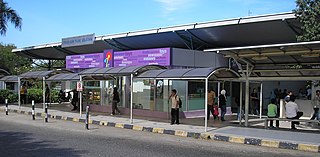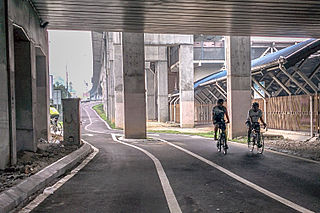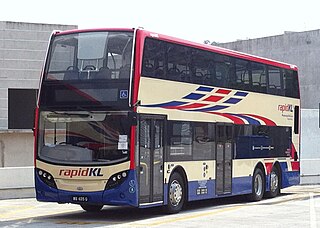 W
WBandar Tasik Selatan station (BTS) is a Malaysian interchange station located next to and named after Bandar Tasik Selatan, in Kuala Lumpur. The station serves as both a stop and an interchange for the KTM Komuter's Seremban Line, KTM ETS, the LRT Sri Petaling Line, and the Express Rail Link's KLIA Transit trains. BTS is integrated with the Terminal Bersepadu Selatan bus hub (TBS). BTS and TBS are developed as an intermodal transportation hub.
 W
WCycling in Kuala Lumpur refers to the bicycle uses in Kuala Lumpur, Malaysia for touring, recreational, work and transportation purpose. It was first appeared on 1938 when there is a first road cycling race that has been introduced in Kuala Lumpur. The introduction of the bicycle in Kuala Lumpur was later become one of the preferred transportation methods for students and mid-class citizens. As Kuala Lumpur begin its rapid urbanization progress since 1960s, the usage of bicycle start to decline as people shifting their transportation method to driving. In recent years however, the roads of the city have seen an increased presence of cyclists, whereas the importance of doing exercise has become more recognized. To match this positive change, and to reduce air pollution, the city urgently needs the introduction of more pavements and bicycle lanes, ideally by leveraging on the vast area that is currently taken up by motorways. Given that Kuala Lumpur lacks many bicycle-friendly routes suitable for cyclists in the city, however, proposals of a bicycle infrastructure of urban bicycling program were drafted, mainly under the Kuala Lumpur Structure Plan 2020 and cycling activism by Cycling Kuala Lumpur in order to encourage more citizens of Kuala Lumpur to cycle in the urban area.
 W
WJapan Airlines Flight 715 was an airplane that crashed in Malaysia on 27 September 1977. It was a McDonnell Douglas DC-8, registration JA8051, on a flight from Haneda Airport in Tokyo, Japan, to Singapore International Airport in Singapore, with stopovers at Kai Tak Airport in Kowloon Bay, Hong Kong, and Sultan Abdul Aziz Shah Airport in Subang, Malaysia. Ten crew and 69 passengers were on board. It was the second-deadliest aviation disaster to occur in Malaysia at the time.
 W
WThe Kuala Lumpur Mini-Bus Service or Bas Mini was one of the oldest and popular Malaysian public bus service, having served in Kuala Lumpur and the Klang Valley region. The buses were primarily painted pink with a white stripe on the sides, and had a capacity of 20-30 passengers, due to its smaller size. The bus operated on a commission basis, with service operators being paid according to the fare they collected.
 W
WPengangkutan Awam Putrajaya Travel & Tours Sdn Bhd dba Nadi Putra is the city bus operator in Putrajaya, the administrative capital of Malaysia, mainly serving Putrajaya city and nearby towns. Originally established as an agency of Putrajaya Corporation under the Ministry of Federal Territories, it was privatised in 2018.
 W
WTransportation in the Klang Valley, which includes Kuala Lumpur – the capital city of Malaysia – consists of highly-developed intermodal infrastructure. This includes an extensive road network, an integrated railway network, airports, and other modes of public transport. The Klang Valley is an urban conglomeration consisting of the city of Kuala Lumpur, as well as surrounding towns and cities in the state of Selangor. The Klang Valley has the country's largest airport, the Kuala Lumpur International Airport (KLIA), as well as the country's largest intermodal transport hub and railway station, Kuala Lumpur Sentral.
 W
WThe Pudu Sentral (formerly Puduraya Terminal ) is the main local service bus terminus in Kuala Lumpur, Malaysia. It was opened in 1976 by the late former Prime Minister Tun Hussein Onn.
 W
WRapid Bus Sdn Bhd is the largest bus operator in Malaysia operating mainly in urban areas of Klang Valley, Penang & Kuantan. As of 2011, Rapid KL service brands unit of Rapid Bus, has operates 167 routes with 1,400 buses covering 980 residential areas with a ridership of about 400,000 per day.
 W
WRapid KL is a public transportation system owned by Prasarana Malaysia and operated by its subsidiaries Rapid Rail and Rapid Bus. With its coverage throughout Kuala Lumpur and Klang Valley areas, it was followed by a federal government restructuring of public transport systems in Kuala Lumpur after the bankruptcy of STAR and PUTRA Light Rapid Transit operators, the precursors to the Ampang/Sri Petaling Lines and Kelana Jaya Line respectively. In 2003, it had inherited bus services and assets formerly operated and owned by Intrakota and Cityliner after being bailed out. Four years later, the Malaysian government had bailed out KL Infrastructure Group, the owner and operation concession holder for the Kuala Lumpur monorail, and had placed it under ownership of Prasarana.